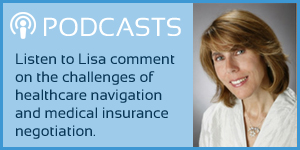Healthcare Reform Compromised Unless Patient Has a PHA
- Feb
- 27
- Posted by lisaberryb
- Posted in Blog
To write healthcare reform is badly needed in our country is elementary. The situation is more complicated than universal coverage (although that’s a good thing.) The problem is how to obtain coverage that actually gets you something. If anyone is working with just one undamaged widget upstairs, it’s obvious not enough quality providers in reputable medical facilities exist to accomodate the vast numbers of aging citizens experiencing more longevity. Add to that those statistically not likely to call on medical resources younger in their lives, but, as the saying goes, “Life happens.” Younger people dealing with health and emotional conditions, in need of quality care, add to the stress on our already-stressed healthcare system.
Enter the Personal Healthcare Advocate (PHA) developed and championed by SOUL SHERPA. A PHA is capable of much more than the traditional model of the agent who fills the role of Durable Power of Attorney for Healthcare. With the latter, it’s usually a spouse or other family member named to consult with a patient’s medical staff to determine how a patient’s plan of care is working. This agent is also left with the unenviable task of deciding when enough proactive care is no longer useful should that patient be rendered unable, and in accordance with that patient’s wishes, reluctantly agree to transition to palliative care measures. These agents are loving, desirous of doing the right thing, but often limited in medical knowledge. He/she is also emotionally engaged with the patient, often making it torturous to take the next step.
A devoted and knowledgeable Personal Healthcare Advocate (PHA) can effectively and sensitively address these difficulties. A PHA can take the mystery out of medical care, by emotionally supporting the patient along with his/her loved ones, and advocate on behalf of the patient with others who comprise the medical care team and have access to the medical facts occurring. If I’m a patient with insurance coverage, that’s a good thing. If I’m a patient who also has a PHA who isn’t in a rush to leave my bedside, is tracking my condition physically and emotionally, and not allowing any detrimental action to take place (such as the hurry to have me discharged sooner than is safe,) tracking my medication, and privy to my previously stated (in writing) wishes regarding my care, it’s a GREAT thing.
Patients have required further hospitalization due to being discharged too soon. They’ve suffered because no one monitored their water intake, no one was available to doublecheck their prescriptions, or to ensure their balance was steady. Accidents will happen, but their liklihood is tremendously reduced with a PHA beside a vulnerable patient (young, middle-aged or old.)
Only after Lisa practically lived on a cot in my room at Los Robles Regional Medical Center in Thousand Oaks, California (after I suffered my moderate stroke in November 2011) did I see how someone else who knew my medical history and personal wishes for treatment prove invaluable when I wasn’t strong enough to speak for myself. Discharge decisions based upon business rather than care will become more common in the future. When I was told by the floor’s case manager it was time for me to go home (where I lived independently) Lisa fought that decision by saying she’d appeal the decision with Medicare as well as with each member of the Board of Directors of the hospital. (Believe me, she would have reached every single one of them!) I couldn’t even stand with the help of a walker and the nurse manager was ready to escort me out the door. Lisa wasted no time destroying that recommendation. Being allowed to stay in the hospital a few more days, I was able to stabilize a little more. Lisa used that time to put into place a realistic post-hospital care and rehabilitation plan for me. She fought, like every PHA needs to be prepared to fight. Not only did I come out a winner (I feel great, am exercising, and looking forward to my 101st birthday on July 4th,) but the healthcare system also won because I wasn’t discharged too early where I likely would have reinjured myself in some way (a fall, an inability to read and administer my new medicines,) and had to be readmitted into Los Robles, resulting in an even bigger medical bill.
I recommend everyone identity a PHA who is in it for the long run with you as a patient. Everyone will win all around: patient, loved ones, PHA, medical staff and medical insurance providers. Universal coverage will work only with the addition of an innovative resource, the Personal Health Advocate (PHA.) In my house, we call them Soul Sherpas. Get yours now. If you’re unsure where to start, contact Lisa for a complimentary consultation at 818.512.6803.
Contact Information
- 818.512.6803
- lisaberryb@stanfordalumni.org
- Follow DependableDoc© on Twitter!
Services Cover:
- Medical
- Legal
- Financial
- Insurance
- Emotional Support






